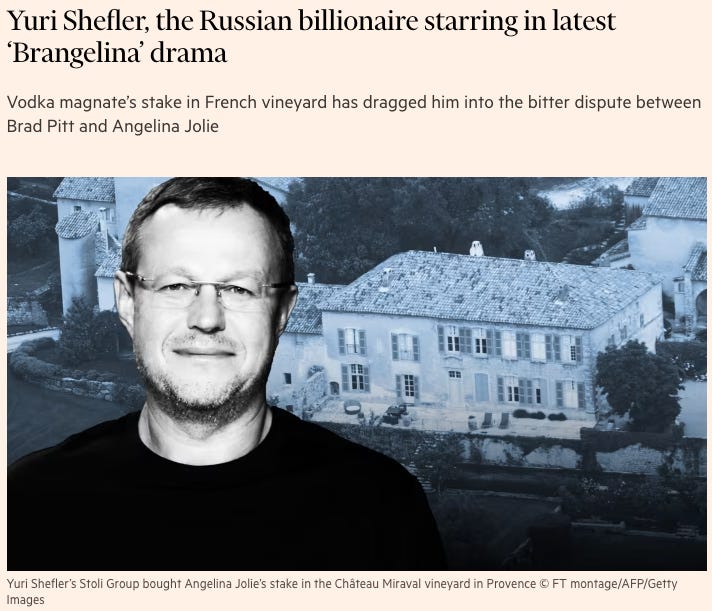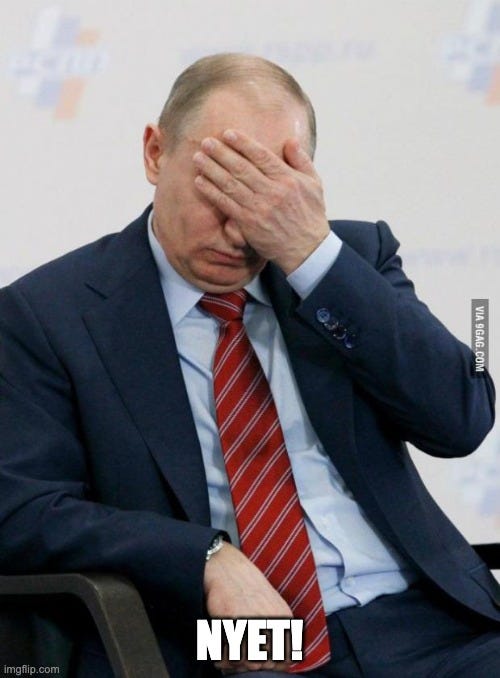💥New Chapter 11 BK - Stoli Group (USA) LLC💥

For once when we say “pour one out,” we’re actually being literal. 🍸
On November 27, 2024, NY-based Stoli Group (USA) LLC (“Stoli”) and Kentucky Owl LLC* (“KO”)(together, the “debtors”) filed chapter 11 bankruptcy cases in the Northern District of Texas (Judge Everett).** The debtors are distributors of Stoli products in the US; they are both DE LLCs with offices and operations in NYC; they are managed, however, by the executive leadership of the Stoli Group, based in Luxembourg, and owned by S.P.I. Spirits (Cyprus) Limited.
We’re going to assume you haven’t been living under a rock and therefore know what “Stoli products” are. If, however, you’re one of those alcohol-avoidant Gen-Zers (you did this!)*** … well, first, good luck in this godforsaken industry and, second, just look at that bedazzling bottle above (for its part, KO is in the whiskey business). Just looking at that thing made Johnny long for a big a$$ martini.
While connected to NYC and Switzerland (and Texas, 🤷♀️), it’s the debtors’ connection to the motherland — Vladimir Putin’s Russia — that kicks off this sordid story. Indeed, we’ve seen plenty of debtors drop the old Russia/Ukraine war excuse in their bankruptcy papers but never quite like this. Let’s get this party started:
“Pursuant to an executive order of Russian President Vladimir Putin, issued in March 2000 shortly after his coming to power, prescribing to “reinstate and protect the state’s rights” in vodka trademarks privatized in the 1990s, the Stoli Group has been defending its rights to the Stolichnaya and Moskovskaya vodka trademarks against Russian state enterprise FKP Sojuzplodoimport over more than twenty-three (23) years in courts of multiple jurisdictions, including the United States. The Stoli Group has been forced to spend dozens of millions of dollars on this long-term court battle across the globe with the Russian authorities.”“Dozens of millions of dollars” is an odd way of framing that but you get the idea. There’s more:
“In connection with that ongoing litigation and his criticism of the Putin regime, the founder and beneficial owner of the Stoli Group, Mr. Yuri Shefler, has been the subject of personal persecution by the Putin regime. Mr. Shefler was forced to leave Russia in 2002 and has been unable to return since then due to fabricated criminal charges (all of which were eventually dropped). In the 2010s, Russia made extradition requests to the United Kingdom and Switzerland concerning Mr. Shefler, both of which were rejected as unjustified and politically motivated. Mr. Shefler was subsequently granted asylum by Switzerland and UK nationality by the UK government.”For the uninitiated, Shefler is a billionaire whose net worth is estimated, according to the ever-more-unreliable Wikipedia, at $1.5b as of March ‘22. This dude is something else. You may have heard of him back in 2015 when he offloaded one of the world’s biggest yachts, the Serene, to Saudi Crown Prince Mohammed bin Salman for a piddling $550mm. Or you may have heard his name embroiled in the messy Brad Pitt and Angelina Jolie divorce, after the latter sold her interest in a jointly owned winery to Shefler.
OR you may have heard of him because you either shopped via, or hornily ogled at, an old Victoria’s Secret catalogue. Shefler was married to model Tatiana Kovylina.
ORRRR you may have heard of him because he’s got a history with Ksenia Sukhinova who was Miss Russia.
The guys hangs with uber-attractive women; he has gobs of money; he is a dual UK and Israeli citizen; and he’s a designated “extremist,” lol, by the Tambov District Court of the Tambov Oblast of Russia due to his help “…providing humanitarian aid and engaging in marketing activities in support of refugees from Ukraine.” Homie sounds legit like James Bond. Someone cast the biopic!
Unfortunately, not all of that is good for business. There’s that itty bitty matter of the Russian government seizing two of the Stoli Group’s remaining distilleries in Russia, for instance. Nothing like $100mm of value going poof.
Wait. You didn’t think Putin would stop there, did you? Per the debtors:
“In August 2024, the Stoli Group’s IT infrastructure suffered severe disruption in the wake of a data breach and ransomware attack. The attack caused substantial operational issues throughout all companies within the Stoli Group, including Stoli USA and KO, due to the Stoli Group’s enterprise resource planning (ERP) system being disabled and most of the Stoli Group’s internal processes (including accounting functions) being forced into a manual entry mode. These systems will be fully restored no earlier than in the first quarter of 2025.”Hot damn Putin is savage AF. He’s in the midst of a war and yet he still finds time to bounty Shefler to the hacking farms.
Putin wasn’t the only one fed up with the debtors. Each debtor is a party to a credit agreement with secured lender Fifth Third Bank NA (“Fifth Third”). As of the petition date, Stoli owes ~$41mm under its revolver and KO owes ~$37.3mm under its revolver (total ~$78.4mm). Starting on July 17, 2024, and then again four times thereafter, Fifth Third dropped default notices on the debtors like their hot, alleging and asserting “ongoing defaults.” Is being “wanted” by Putin a default? Dating too many models? The bankruptcy papers don’t clarify what the alleged defaults were but clearly Fifth Third was on the warpath: it sent ten letters to KO’s trade vendors, suppliers and storage providers airing all kinds of beef. Suffice it to say, this was disruptive to the business.
The debtors efforts to negotiate a resolution with Fifth Third — represented by Goldberg Kohn Ltd. (Steven Wickman, Jeremy Downs) and Holland & Knight LLP (Brent McIlwain, Christopher Bailey) — stalled. They then hired Riveron Consulting LLC (Steven Wybo) as restructuring and financial advisor to assist*** but, alas, the debtors and Fifth Third failed to see eye to eye and the war continued. Luckily in this war, there are no suicide drones.
Yet.
Upon a read of the first day papers, our Johnny — about a half bottle deep into some Stoli of his own by that point — questioned whether the debtors had Fifth Third’s consent to use cash collateral. It seemed ‘not,’ but he wondered if that might be the vodka impairing his read of the material. The papers seemed strangely vague on the point.
On December 2, 2024, Fifth Third clarified things; it lobbed in a “limited” objection and reservation of rights with respect to the debtors’ cash collateral motion. “This is not a case where the parties were aligned on a chapter 11 filing, much less the specifics of cash collateral consent,” they say.
But it may not be as bad as that banger sentence might suggest. Hence the “limited” objection. Fifth Third adds:
“Generally, Lender does not object to the Debtors using cash collateral to maintain their current operations while the parties conduct expedited diligence, discussions and possibly discovery. However, Lender believes that Debtors’ proposed cash collateral use—even on an interim basis—is likely to consume a material amount of Lender’s collateral. The Budget for the proposed interim cash collateral order and related detail shared with Lender since the Petition Date indicate that the Debtors are requesting to spend cash collateral and sell inventory without sufficient replacement collateral for the foreseeable future. Replacement liens and adequate protection claims against Lender’s existing collateral do little to address this; Lender already has prepetition liens on substantially all of the Debtors' assets. The Debtors’ Declaration gives the impression that they should be allowed to impact the collateral this way because Lender is significantly over-secured. The extent of Lender’s equity cushion is speculative at this point, and nothing in the Debtors’ pleadings addresses the end to which they are asking to erode it. Absent a clear showing of adequate protection of Lender’s interests by the Debtors and alignment around an agreeable path forward in these cases (neither of which presently exist), any support from Lender to an interim cash collateral order will likely turn into a contested hearing.”Or, in short, “f*ck you, pay me” (adequate protection for principal, interest, fees or otherwise). You know who they don’t want to see paid? RX pros, that’s who.
“To be clear, the Lender has not consented and does not consent to a carveout in these cases for the Debtors’ professional fees and expenses, and it does not otherwise consent to the use of cash collateral under an interim order to pay any such amounts. Lender recognizes that carveouts are a typical feature of complex chapter 11 cases, but that is because the vast majority of such cases result in consensual cash collateral or DIP financing arrangements between debtors and lenders – often driven, in large part, by the need for the debtor’s professionals to be assured payment for months’ worth of services.”Hot damn! Lender on RX pro violence, lol!! Did Putin put Goldberg Kohn up to this?! Debtors’ counsel, Foley & Lardner LLP (Holland O’Neil, Stephen Jones, Mary Rofaeil, Zachary Zahn, Ann Marie Uetz, Michael Small), surely loves the prospect of no pro fee carveout, right? Spoiler alert:
“Lender has proposed language to the Debtors for the proposed interim cash collateral order to clarify that any allowance of, and use of cash collateral to pay, professional fees and expenses are subject to further order of the Court, but Lender understands this is not acceptable to the Debtors.”The first day hearing is later today, Tuesday December 3, 2024 at 9:30am CT. Looks like it might be a fun one. 🍿
*According to its bankruptcy petition, KO’s website is allegedly “kentuckybourbon.com” but it turns out that is wrong. Rather, it’s “kentuckyowlbourbon.com.” Kind of an important detail, we’d think.
**It’s not clear at all from the bankruptcy papers what the nexus to this jurisdiction is. While the debtors do reference doing some business in Texas, they don’t specify anywhere that we found why jurisdiction in Texas is justified.
***Aside from the drama surrounding Putin and the data breach and the separate drama with Fifth Third, the debtors blame “…a decline and softening of demand for alcohol and spirits products post-COVID and especially beginning in 2023 and continuing into 2024” for their strained financial condition.
⏩ One to Watch: Mavenir Systems Inc. ⏩
TX-based Mavenir Systems Inc. is, according to its surprisingly well-followed X account, a tech company focused on “…building the future of networks today with cloud-native, AI-enabled solutions which are green by design and empowering operators.” Holy sh*t: that’s an impressive buzzword hit rate and the company website does a good job backing that up with a third-class D-grade two-minute “future of networks” hype video that had us clamoring for a micro dose of mushrooms. What the f*ck is going on here?
Distress. Distress is going on here.
Once upon a time the company took on a good chunk of debt to … well … do whatever it is that it does. It carries a $75mm ‘26 RCF followed by a $568mm ‘28 term loan and a $143mm ‘28 term loan — both of which price firmly at distressed levels (at 69 and 72c on the dollar, respectively, as of November 25, 2024). Koch Strategic Platforms LLC, a subsidiary of Koch Investments Group (“Koch”), invested $500mm into the company in ‘21 for a minority stake (leaving Siris Capital as majority owner) and then doubled down with an additional $155mm in ‘22. The company has been — and continues to be — big time dependent on free-spending equity sponsors. Koch must be loving the fact that they’re looking up at term lenders like Fortress, Octagon, Invesco, Bain, Southpoint and Brigade, all of whom have organized (with Davis Polk & Wardwell LLP) and are, we hear, negotiating with the company (and its counsel, Sidley Austin LLP) over a proposed restructuring that will undoubtedly impair the motherf*cking hell out of all of that equity. Is it time to cue the Joker-incinerates-cash meme yet?
The ratings agencies have been having a field day with this company. And for good cause. Mavenir missed an interest payment in September. On November 22, 2024, Moody’s Ratings downgraded the company’s corporate rated to Caa3 from Caa1 with a matching downgrade for the first lien credit facility; it also changed the company’s outlook from stable to negative. This is a pretty savage summary of the current state of affairs (per Moody’s):
“The downgrade … to Caa3 reflects the high risk of default given the company's weak liquidity, specifically very limited cash, revolver capacity or alternate sources of capital. After investing over $1.5 billion, the company's equity sponsors have turned definitely uncommitted to providing any additional capital support, leaving no certain back-stop. This was evident in the recent default when the company missed an interest payment in September. The company continues to burn cash which we estimate to be approximately $45 million quarterly, and has limited liquidity ($21.5 million at the end of Q2 and little to no RCF availability). As a result, the equity sponsors are working to raise bridge financing nearly quarterly to shore up liquidity and provide working capital while seeking to raise longer-term equity capital from new investors. As a result, we project leverage, which is already very high to further increase and the risk of another default to remain very probable if the company and or the equity sponsors fail to raise additional capital to improve the liquidity profile. Likewise, any restructuring of the debt at a discount is likely to be considered a distressed exchange, also considered a default under our definition. Without a material recapitalization, the capital structure is untenable given the very high leverage, weak liquidity profile, and poor operating performance.”Moody’s doesn’t take kindly to the company’s sponsors:
“Mavenir's credit profile is negatively impacted by governance risk … which reflects highly concentrated ownership with private equity sponsors that are pursuing a very aggressive, venture-capital-like growth strategy in parallel with a core business which produces at least 85% of consolidated revenue. The company spends substantial funds on research and development (near 50% of revenue) for new business opportunities, producing very low profitability, negative free cash flows and very high leverage. This business model requires the sponsors to regularly pre-fund the business with capital including both debt and equity to maintain liquidity.”Well hot damn. Moody’s is bearish all over the place. Sh*te governance? ✅. Too much R&D? ✅. No scale? ✅. Falling revenues? ✅. High customer concentration? ✅. Limited market share in a “very large market”? ✅. Strained and diminishing liquidity? ✅. Negative EBITDA? ✅. Free cash flow deficits? ✅. Are you still even reading this? ✅. Moody’s doesn’t expect the sponsors to pony up another dime here which means the term lenders have their work cut out from them. Should they expect a good recovery in this situation? Not according to Moody’s:
“We rate the Senior Secured Credit Facilities Caa3 … reflecting a Caa3-PD Probability of Default Rating and our expectation for an average recovery of approximately 50% in a default scenario.”Let’s see how this one plays out.
📤 Notice📤
🍾Congratulations to…🍾
FTI Consulting Inc. (Conor Tully) for securing the financial advisor mandate on behalf of the official committee of unsecured creditors in the Gritstone bio Inc. bankruptcy case.
Proskauer LLP (Brian Rosen, Ehud Barak, Daniel Desatnik, Paul Possinger) and Stinson LLP (Nicholas Zluticky, Zachary Hemenway, Lucas Schneider) for securing the legal mandate on behalf of the “statutory unsecured claimholders’ committee” in the Wellpath Holdings Inc. chapter 11 bankruptcy cases.
📚Resources📚
We have compiled a list of a$$-kicking resources on the topics of restructuring, tech, finance, investing, and disruption. 💥You can find it here💥.











